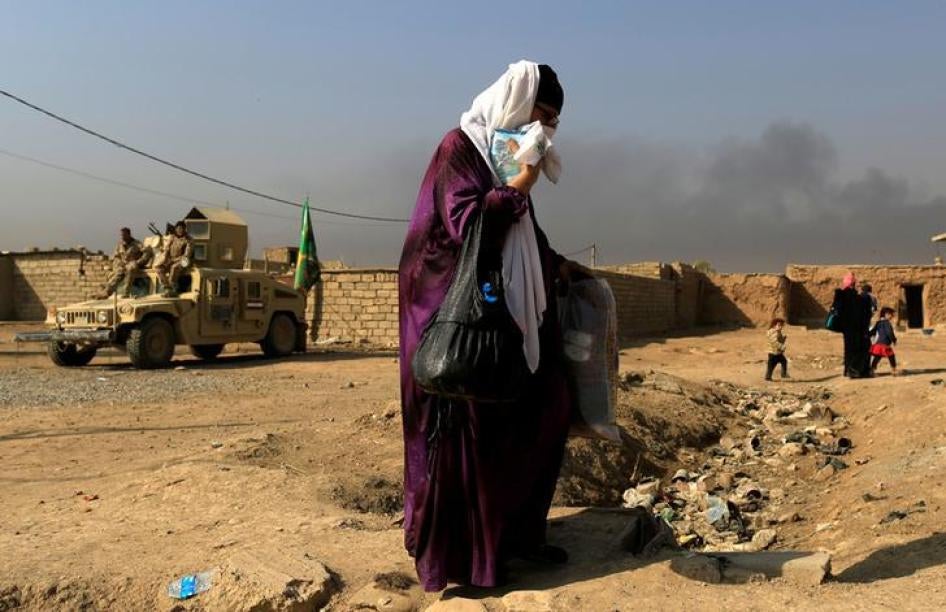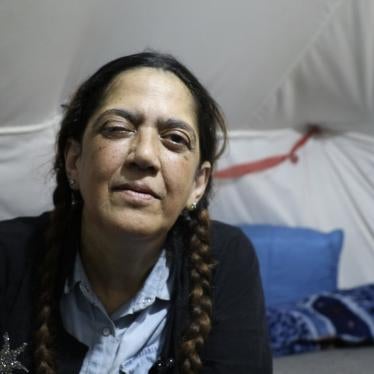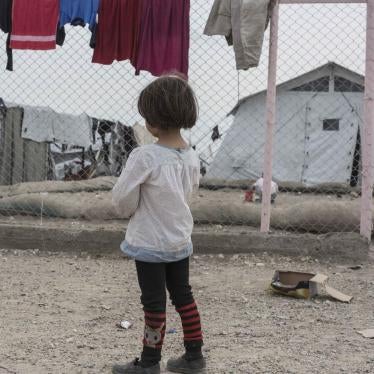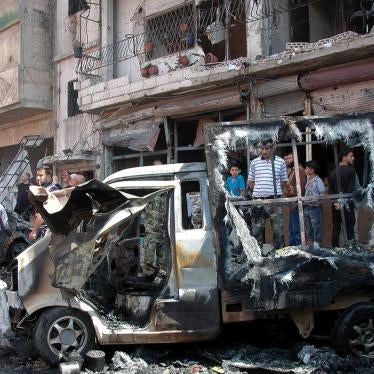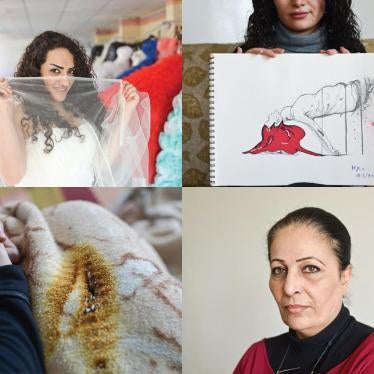The world needs a plan to deal with the wives and children of the Islamic State's defeated jihadis.
Since Aug. 30, Iraqi authorities have been holding about 1,400 foreign women and children who escaped from Islamic State-controlled territories during recent battles to free areas around Mosul, the country’s second-largest city, and surrendered to military forces in the area. The families — who together are from at least 10 countries, including European states such as France and Germany — have been shuffled among various sites in Iraq, but authorities have not clarified why they are holding them or what they plan to do with them. No one seems to have a plan.
We interviewed some of these women in early September in a set of large tents in the transit hall of a camp housing tens of thousands displaced by the battle in Mosul. (Authorities have since transferred the whole group to an overcrowded prison in the area.) Many told us they had loved raising their children in what one woman called “an Islamic paradise,” and that Iraqi forces had been mistreating them since they had surrendered. Mostly they seemed exhausted, anxious, and unsure of what would now happen to them and their children. “Will they keep us here forever?” one foreign woman asked us. “I think our country doesn’t want us back.” She had one child; her sister had three and was visibly pregnant.
The question of what happens to these foreign women and children will not go away. And the number of families related to Islamic State fighters who are detained in Iraq will most likely grow in the coming months, as Iraqi security forces take more territory from the organization. Those in detention now face the risk of unfair trials, torture, and the death penalty. The children caught up in detention, meanwhile, risk being treated like criminals rather than being offered rehabilitation.
Iraq has proven incapable of conducting basic screening of Islamic State members and their family members — most of whom carry no identification — much less providing fair trials for those charged with crimes. The truth is that it would be politically toxic for Iraqi authorities to treat Islamic State affiliates and their families “well.” Many Iraqi citizens are resentful of the foreign families that came to the country to live under a regime that abused their own communities, and they want to see them pay a price.
The international community could go a long way toward resolving this problem by developing a unified position on what to do about these families. Instead, in private conversations we had with four European diplomats, they used technical arguments to emphasize how little responsibility their countries wanted to take toward their own citizens who had chosen to go to Islamic State-held territory.
The diplomats noted that their governments had issued travel warnings for Iraq and Syria, and that they had no consular obligations to people who had chosen to travel there. This comes in stark contrast to efforts countries usually make to protect and rescue their nationals in countries on travel ban lists.
These European diplomats also said that consular procedure requires their nationals to request assistance, which can be transmitted through a third party like a detaining force or an organization like the International Committee of the Red Cross. Only the individuals themselves can make such a request, though — family members cannot. But the embassies do not seem to have instructed Iraqi authorities or anyone else to inform the women and children from their countries of their rights to seek consular access. Are they hoping that these women and children will not request assistance so that it won’t be their problem?
The home countries of these women have an important role to play in finding solutions, including potential third-country resettlement. They should not hide behind procedure.
If home countries don’t take steps to bring these women and children home, there is every reason to fear for their safety. The Iraqi authorities have so far not conducted individual assessments to determine whether they have committed crimes, nor released those they are not going to charge. In fact, it seems that no detainees have been brought before a judge. Our research has already shown how detainees can spend months in inhumane conditions, and that children are exposed to torture and a range of other violations.
Iraq cannot conscionably condemn these women and children to an indefinite, arbitrary detention. Membership in the Islamic State is an offense under the country’s terrorism law, but the women may have been coerced to come to Iraq with husbands who belonged to the organization. Other women may have come willingly but may have done nothing to support the Islamic State and simply joined it in name only. Still others may be responsible for serious crimes, such as acting as enforcers against other women or detaining captured members of Iraq’s minority communities, like the Yazidis, in their homes. Meanwhile, children who became members of the Islamic State are obviously victims of child recruitment in need of rehabilitation, not prosecution.
It is illegal under international and Iraqi law to punish someone for the alleged crimes of their spouse or their parents. But for now, Iraqi authorities are doing nothing to draw such distinctions.
The prospects for those who eventually face trial are grim. Iraqi and Kurdistan Regional Government authorities are pursuing prosecutions against thousands of detainees under counterterrorism legislation for crimes tied to their alleged affiliation with the Islamic State in proceedings undermined by serious due process violations. Our research, however, shows that this process has been marred by rampant abuse, including allegations of torture and due process violations in the current screening, detention, and prosecution campaign. In addition, defendants face the death penalty — one of only two sentences allowed for those convicted under the Iraqi counterterrorism law.
Charging the adult women with crimes will also pose further legal and political questions with no clear answer. If Iraqi authorities convict and imprison some of the women who cannot be repatriated, what will happen once they have completed their sentence? And what will happen to those the government does not charge, if they have nowhere to go?
Meanwhile, there is no reason not to cooperate to assist children without identity documents. All countries should offer to work with Iraqi authorities to determine the children’s parentage (including through possible DNA testing) and to grant citizenship and possibly repatriate them to their parents’ countries. For children born in Iraq who would otherwise be stateless, Iraqi authorities will have to grant them nationality in accordance with Iraqi and international law.
And what will happen to the children of women who are convicted and given a prison sentence or the death penalty? I have heard Western diplomats discussing the potential option of separating children from their mothers and sending the children to live with relatives back home. International law requires that authorities examine each child’s case and, with the child’s participation, determine what arrangement is in his or her best interest. A blanket policy to separate young children from their politically undesirable mothers and deport the children is not a legitimate default plan.
In all cases, Iraq should ensure that women and children are not deported or repatriated if they would be at risk in their home countries of persecution, torture, or unfair trials for their alleged Islamic State affiliation.
Children deserve a chance at a future, not detention for their parents’ alleged crimes. Their mothers deserve to be presumed innocent and tried promptly if there is evidence of guilt of serious crimes. And Iraq deserves international support to resolve this issue. But so far, everyone is passing the buck.

